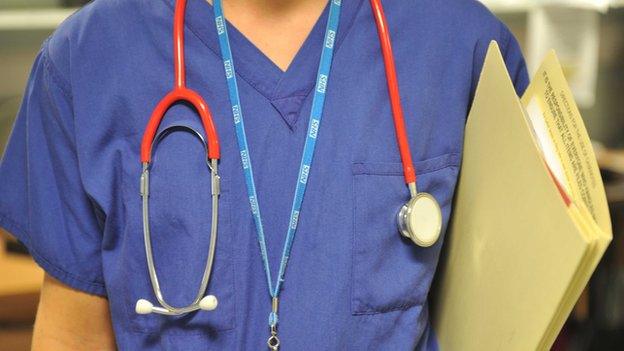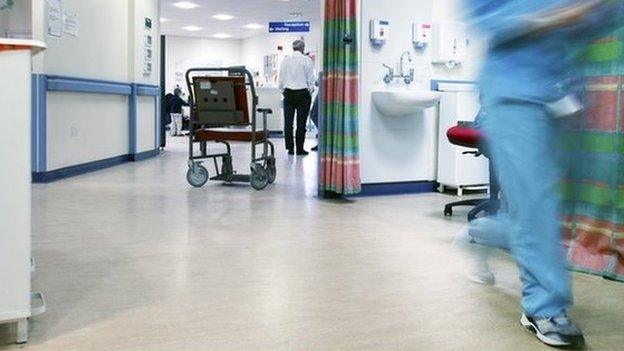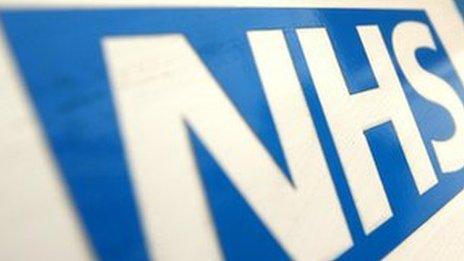NHS finances 'worsening' as deficit nears £500m
- Published

The NHS in England has run up a deficit of nearly £500m in the first few months of the financial year, official figures show.
Regulators said the sums were greater than had been expected and warned NHS bosses to "get a grip".
One of the key causes seems to be the rising demand for services.
The regulators said hospitals in particular were struggling to keep up - with signs emerging hitting key waiting time targets was getting harder.
The figures have been published in board papers released by Monitor and the Trust Development Agency, which oversee foundation trusts and non-foundation trusts respectively.
Both sectors posted deficits - the first time foundation trusts have done so.
The figures from Monitor showed a deficit of £167m had been run up in the first quarter of 2014-15 - above the £80m forecast. A total of 86 out of 147 trusts were in the red. This time last year they posted a £27m surplus.
'Tight financial grip'
The data for the non-foundation trusts, which covers the first four months, showed there had been a £300m deficit, compared with a £224m forecast. Thirty-three out of 98 were in deficit.
The figures covered all types of trusts, including mental health and ambulance services.

Analysis by Adam Brimelow, BBC Health correspondent
Deficits are not just a problem for the accountants. Ultimately they can have a tangible effect on patients. Financial problems often go hand-in-hand with poor performance on waiting times, or low staffing levels which may - in turn - impact on safety and the quality of care.
The most obvious solution for struggling trusts is to improve efficiency - for example by cutting avoidable admissions, ensuring patients are discharged promptly, or reducing their reliance on expensive agency staff.
They may, though, reach a point where they are forced to downgrade or close services. But as Nigel Edwards from the Nuffield Trust points out, under the NHS payments system where money follows the patient, this can mean losing valuable income. Once trusts slip into deficit, climbing out can be a huge challenge.

But the biggest problems were seen in hospital trusts - over two thirds have accrued deficits - and this was also illustrated by the difficulties they were experiencing in meeting their waiting time targets.
The two-month target for cancer patients to get their first treatment after an urgent referral was missed in the first quarter - the second time in a row that this has happened. Although other cancer targets, including the two-week wait to see a specialist after an urgent referral, have been met.
The four-hour A&E waiting time target was met in the first quarter, but performance did deteriorate during several weeks despite the period covering spring and summer which are traditionally easier times for hospitals.
But the 18-week target for routine surgery was missed in June and July - although ministers have signalled to the NHS that standards can slip until the end of the year while they deal with the backlog of long waits.
Monitor chief executive Dr David Bennett said: "Trusts are striving to overcome the challenges they face while still meeting patients' expectations for quality care."
But he said more progress could be made, particularly by "getting a grip" on staffing costs - the use of agency staff is high in many places - as well as identifying other savings.
A Department of Health spokesman pointed out the NHS budget, which stands at over £100bn for the year, had been protected this Parliament.
He added: "We understand some trusts are facing challenges because of increasing demand but they must have a tight financial grip and ensure they live within their means.
"Delivering high-quality services and balancing the books must go hand in hand and we expect trusts to deliver this during the course of the financial year."
Rob Webster, chief executive of the NHS Confederation, which represents trusts, said: "We have been warning for some time that NHS trusts will fall further into deficit as they try to balance rising demand for care against flat funding."
He added that trusts were "working tirelessly" to keep standards up.
- Published10 July 2014

- Published7 July 2014

- Published29 June 2014

- Published18 June 2014

- Published1 April 2014
